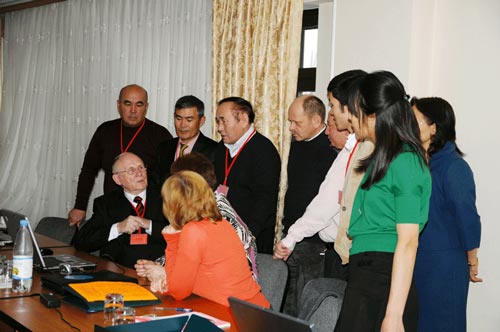 Since 2010, CIMMYT has been orchestrating the project “Strengthening the Plant Biotechnology Capacity for Sustainable Utilization of Plant Genetic Resources for Food and Agriculture in Kazakhstan”, in conjunction with the National Center for Biotechnology of the Republic of Kazakhstan, JSC “KazAgroInnovation” of the Ministry of Agriculture, and FAO. This initiative aims to improve breeding methods for the most important crops through the application of biotechnology and effective use of plant genetic resources, as well as identifying priorities and measures to develop these areas within Kazakhstani research institutions.
Since 2010, CIMMYT has been orchestrating the project “Strengthening the Plant Biotechnology Capacity for Sustainable Utilization of Plant Genetic Resources for Food and Agriculture in Kazakhstan”, in conjunction with the National Center for Biotechnology of the Republic of Kazakhstan, JSC “KazAgroInnovation” of the Ministry of Agriculture, and FAO. This initiative aims to improve breeding methods for the most important crops through the application of biotechnology and effective use of plant genetic resources, as well as identifying priorities and measures to develop these areas within Kazakhstani research institutions.
As part of the project, CIMMYT organized a training workshop on biosafety, regulations, biotechnology policy issues, plant genetic resources, and breeding, during 05-09 December 2011, in Almaty, Kazakhstan. The event was attended by scientists and experts from breeding organizations affiliated with JSC “KazAgroInnovation” and academic institutions of the Ministry of Education and Science of Kazakhstan. Welcoming the participants, Muratbek Karabayev, CIMMYT-Kazakhstan, spoke of Kazakhstan’s potential to become a world-leading exporter of high-quality grain and crops, given its huge land resources, well-developed agricultural infrastructure, and scientific capacity. Izbassar Rahimbayev, Institute of Plant Biology and Biotechnology and Guy Riba, National Institute for Agricultural Research, France, then both highlighted the importance of biosafety and bioethics in the experiments and applications of genetic engineering. Riba informed participants about the large contribution of biotechnology to food security, and emphasized the role of well-established international collaborations in the development of agriculture. The legal aspects of labeling genetically modified products were elaborated on by Evgeniy Klimov, President of the Kazakhstan Foundation for Integration of Ecological Culture.
Edgar Klose, Maerkish Institute for Promotion of Technology and Innovation, Germany, lectured on the concept of sustainable development, with particular reference to reasonable economies, the environment, and social justice. He also briefed participants on the latest devices and technologies being used in Europe for plant breeding, crop production, and ecology. Representing the Quarantine Nursery of Cereal Crops, Kazakhstan Ministry of Agriculture, Amangeldy Sarbaev, reported on issues related to testing imported seed material, as well as the ongoing collaborations between CIMMYT and the Kazakh Research Institute of Farming and Crop Production. Shymbolat Rsaliev, Institute for Biological Safety Problems, Kazakhstan, also spoke of the necessary international approach, especially when considering plant pathogens such as the potential threat of the stem rust Ug99.
Nazira Bishimbaeva, Institute of Plant Biology and Technology, Kazakhstan, spoke of the possibilities of expanding the genetic basis of selection through biotechnological techniques, particularly stem cell engineering and somaclonal variation. She described the genotype-independent plant regeneration technology for wheat lines with valuable traits, which was developed at the Institute. Biotechnology methods are already being used at the International Potato Center (IPC), and were explained at the workshop by Carlos Carli, IPC Central Asian Liaison Officer. The participants were unanimous in concluding that the national agricultural and biological research systems in Kazakhstan should utilize plant genetic resources for the benefit of food production, as well as ensuring that research and commercial production integrates advanced approaches and technologies. This will increase the efficiency of the agricultural sector in maintaining improved national food security and agricultural export capacities.